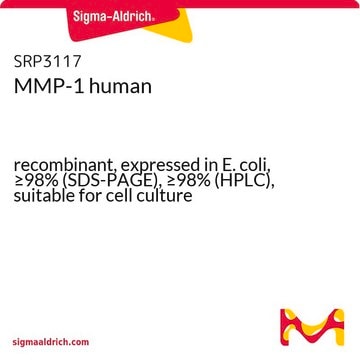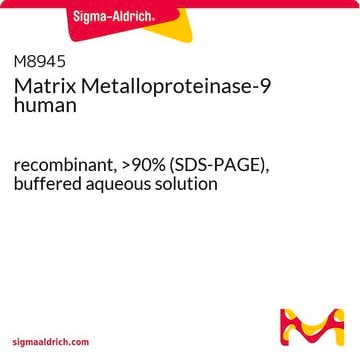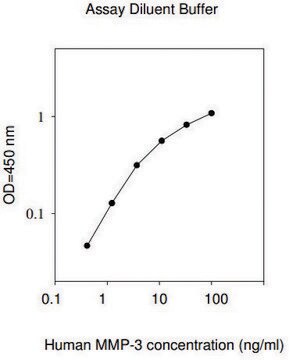SRP7783
MMP-3 human
recombinant, expressed in E. coli, ≥95% (SDS-PAGE), ≥95% (HPLC)
Synonym(s):
EC 3, Matrix metalloproteinase-3, Stromelysin-1
Sign Into View Organizational & Contract Pricing
All Photos(1)
About This Item
Recommended Products
biological source
human
recombinant
expressed in E. coli
Assay
≥95% (HPLC)
≥95% (SDS-PAGE)
form
lyophilized
mol wt
~19.5 kDa
packaging
pkg of 10 μg
technique(s)
western blot (chemiluminescent): suitable
impurities
endotoxin, tested
NCBI accession no.
shipped in
wet ice
storage temp.
−20°C
Gene Information
human ... MMP3(4314)
General description
Active MMP-3 catalytic domain from human cDNA, expressed in E. coli and purified using proprietary technologies. The active MMP-3 is very useful in studying enzyme kinetics, cleave target substrates, and screen for inhibitors.
The gene JE is an early growth response gene that was first identified in mouse 3T3 cells. The gene is mapped to mouse chromosome 11. It encodes a member of the CC subfamily, the members of which contain characteristic two adjacent cysteine residues.
Application
MCP-1 has been used to induce chemotaxis in mice macrophages.
MMP-3 human has been used to develop a simple and sensitive electrogenerated chemiluminescence (electrochemiluminescence (ECL)) peptide-based bioassay for the detection of matrix metalloproteinases releasing from living cells.
Biochem/physiol Actions
Matrix metallopeptidase 3 (MMP3) has a broad substrate specificity and is capable of degrading fibronectin, laminin, collagens III, IV, IX, and X, and cartilage proteoglycans. It participates in wound repair, progression of atherosclerosis, tissue remodeling and tumor initiation. MMP3 variants can be associated with hypertrophy of interventricular septum or hypertrophic cardiomyopathy.
The gene JE, also referred to as MCP-1 (monocyte chemoattractant protein-1), encodes a secreted chemokine that functions as a chemoattractant for monocytes and may activate their anti-tumor properties. This protein may serve as a potential therapeutic anticancer agent.
Physical form
Lyophilized powder.
Reconstitution
Centrifuge the vial prior to opening. Avoid freeze-thaw cycles.
Reconstitute in sterile PBS to a concentration of 0.1-1.0 mg/mL. This solution can then be diluted into other aqueous buffers.
Storage Class Code
11 - Combustible Solids
WGK
WGK 3
Flash Point(F)
Not applicable
Flash Point(C)
Not applicable
Certificates of Analysis (COA)
Search for Certificates of Analysis (COA) by entering the products Lot/Batch Number. Lot and Batch Numbers can be found on a product’s label following the words ‘Lot’ or ‘Batch’.
Already Own This Product?
Find documentation for the products that you have recently purchased in the Document Library.
Customers Also Viewed
J S Frieling et al.
Oncogene, 36(31), 4498-4507 (2017-04-04)
Parathyroid hormone-related protein (PTHrP) is a critical regulator of bone resorption and augments osteolysis in skeletal malignancies. Here we report that the mature PTHrP
Hematopoietic-Derived Galectin-3 Causes Cellular and Systemic Insulin Resistance.
Li P
Cell, 167, 973-984 (2016)
Grzegorz Wiera et al.
Cellular and molecular life sciences : CMLS, 78(5), 2279-2298 (2020-09-23)
Learning and memory are known to depend on synaptic plasticity. Whereas the involvement of plastic changes at excitatory synapses is well established, plasticity mechanisms at inhibitory synapses only start to be discovered. Extracellular proteolysis is known to be a key
Suppression of tumor formation in vivo by expression of the JE gene in malignant cells.
Rollins BJ and Sunday ME
Molecular and Cellular Biology, 11, 3125-3131 (1991)
Rowan Pentz et al.
Neurobiology of disease, 148, 105150-105150 (2020-11-02)
Matrix metalloproteinase-3 (MMP-3) has been associated with risk of Alzheimer's disease (AD). In this study we introduce a novel role for MMP-3 in degrading nerve growth factor (NGF) in vivo and examine its mRNA and protein expression across the continuum
Our team of scientists has experience in all areas of research including Life Science, Material Science, Chemical Synthesis, Chromatography, Analytical and many others.
Contact Technical Service











